
 |
Over the years, the monthly Ellesmere Rural Deanery Parish
Paper/Border Churchman has been a great source of information for me on life in
Ruyton and surrounding villages in the second half of the 19th
century. Through the 1902 monthly editions, I have been able to trace the
Victoria Reading Room from its inception to it`s opening as a place for men and
boys to meet, rather than the 4 pubs in the village.
In January Mrs. Kenyon and her daughters were leaving
The Cottage in School Road, demolished as Ruyton Dairy expanded, and so the
library they had run for the village was closed.
In the February it was reported that the Kenyon
library had been taken on by the Dr. Cunningham`s family at The Grove in Church
Street and 29 new books had been delivered.
It was during the time when Rev. David Craven was
incumbent, from 1899- 1924, that the Victoria Rooms were planned and built.
In April 1902 a start had been made on the much needed
new Reading Rooms for the men & boys of the village on land which had been
purchased for £50 by the previous Vicar, Rev Frederick Paget Wilkinson. It is worth noting that the road layout would
have been very different before the turnpike road was cut through the rock
below the church at the end of the 18th century, leaving the little
`island` which was probably of no use to the owner of the land between the road
and Gooseberry Lane.
The contractor was Messrs Tommy of Wem under the
supervision of A,E. Lloyd Oswell esq, Architect. The cost was estimated to be £267, not
including the architect`s fees or furniture and £200 had already been promised. On completion the whole property was to be
passed to the Diocesan Trustees.
Besides a large billiard room, there would be a
smaller reading room and `offices`, toilets, and the building would be Ruyton`s memorial to
the late Queen Victoria.
In June 1902 there were more donations for the Reading
Room, including the huge sum of £50 from Mrs. Minton of Rock Ferry – see
Business start ups - Minton`s paintworks
in https://www.eleventowns.uk/history.html
By July the reading Room was tiled, the floors were
finished and it was hoped the work would soon be completed. In August the Rooms
were finished but the sum of £22 was still needed to cover the contract price of £274 and 15 shillings and,
in addition, £15 for architects` fees.
Then there was the cost of furnishing.
On 8th October a meeting was held in The
Rooms attended by over 40 men and lads
The Vicar explained the object of The Rooms , the financial position and
a set of draft rules. Meanwhile the billiard table had been put up and
necessary furniture had been ordered.
Much satisfaction was expressed with the fine premises which would fill
and long felt need. The debt of some £30
(exclusive of the cost of furniture) would be wiped off.
On 27th October the Victoria Reading Rooms
were officially opened by Mrs. Walford of Ruyton Towers (Manor). When the Guests of Honour had departed, about
50 members were enrolled and Mr. Cragg volunteered as Secretary. The number of members soon increased to 80,
plus several honorary members who paid 5 shillings a year, and presumably had a
billiard table at home and plenty of books of their own, but their financial
support for this village facility would have been much appreciated. The billiard table was the gift of Ruyton`s
wealthy benefactor Mr. Rowland Minton in Rock Ferry, Merseyside. The smaller room was to be open on Sundays
from 2.30 to 4.30 for reading the books which had been collected.
So that is the beginnings of the Victoria Reading
Rooms on the funny little `island` at the junction between the Burlton to
Llanymynech Turnpike and the road to LittleNess.
Although there is no mention in 1902 of Church Cottage
next to the Victoria Room, it appears to have been built around the same time
and was allocated to a Church secretary and, presumably, caretaker of The Rooms
As far as we know the Victoria Rooms continued to be
enjoyed by the men and boys in the village, playing billiards and using the
library for many more years. It must be
assumed that as the Kenyon ladies ran their library for all, the Reading Rooms library
would also be available to the ladies of the village.
The Victoria Reading Rooms were presumably still being
used by non drinkers and, hopefully, new books were being acquired and read
until 1939 when the reading rooms ceased to be used as a library, perhaps due
to lack of a willing librarian.
The rooms would have been used for Parochial Church
Council meetings and other church gatherings, such as Confirmation classes and
Sunday School and Christmas parties, up until the early 1980s, and remembered
by people who grew up in Ruyton XI Towns.
After the last village doctor left the village, it
must have been a boon to have the doctors from Knockin and Baschurch holding
surgeries in what was once the Reading Room while the larger Victoria Room
served as a waiting room. People
remember visiting the Knockin doctors,
Hutchinson and Symonson there in the 1970s and early 80s, and Dr. David Lowdon
from the Baschurch surgery remembers continuing consultations there once a week
for a few years after 1988. The advent
of technology and the ethical requirements for doctor and patient interaction
made continuing unfeasible, and arrangements were made to send prescriptions to
Ruyton to be collected from the Victoria Rooms.
In 1981 we got a new, and very enthusiastic vicar,
Robin Bradbury who had a degree in the History of Art and he came up with
several new enterprises and events, which made good use of the Victoria Reading
Rooms. There were courses in various
aspects of religion, meditation meetings and Lent Bread and Soup lunches. The room was also available to rent for
parties.
Robin instigated music events in the church and I
remember going to one on the history of Jazz, and an exhibition at The Grove in
Church Street of Jenny Baker`s
photographs taken on her walk in aid of the church, from Land`s End to John
0`Groats. He also led a Bishop`s
Certificate course using course materials supplied by Lichfield Diocese.
I think it was around that time that the Church
Warden, Major John Bampfield, Bursar at Packwood School, very kindly passed me several
mouldering editions of the Ellesmere Rural Deanery reports from the parishes which
have furnished me with so much history of our village in the second half of the
19th century and the year 1902.
Just before Robin left the village, it was discovered
that the floor joists in the Rooms were suffering from a bad case of rot.
In 2000 Les Foster, became our vicar and did
tremendous work in the church and the Victoria Reading Rooms, largely thanks to
his background in the building trade.
Les put his building knowledge into designing and
overseeing the complete restoring the Victoria Rooms – new floor joists of
course, plus toilets and a fully equipped kitchen in what had been the Reading
Room. The Vicar`s right hand men through all this work were David Dicken and Terry
Williams. To complete the restoration,
Les asked Dr. Jenny Baker to paint the picture which watches over activities in
the hall. The Victoria Rooms were now a
warm and welcoming Church Hall which various village organisations have been
delighted to make use of.
How ironic that when I was about to find out more
about the Art Group, David Dicken, the
founder member of the group, passed away.
Robin had given a talk on the History of Art and it was probably a
co-operation between David and Robin Bradbury, with his degree in Art History, that
decided a group of local artists could come together and work in the Victoria
Room. The group holds exhibitions of their work in the Victoria Room and is
still very active today.
Les Foster also oversaw the modernising changes in the
church, including installing toilets, a small kitchen in the old belfry and
putting in the circular staircase to the new belfry.
It was during Les Foster`s incumbency that Jenny Baker and Anne Smith started their
studies, Anne to be a Reader (Licenced Lay Minister) and Jenny being licensed
as an Ordained Local Minister for the parishes of Ruyton XI Towns, Great Ness
and Little Ness. Jenny and Anne were
able to help Les with a variety of services
During this time, Jenny led another Bishop`s
Certificate Course.
In the early 2000s, the government wanted to encourage
us all to become computer literate and there were some very useful grants
available to make this possible. Colin
Case, Chairman of the Parish Council, who knew a thing or two about applying
for grants, worked with the Vicar put in many hours applying for grants and
buying and installing equipment to give the village a state of the art Broadplace
in the Victoria Rooms, where anyone, child or pensioner, who wanted to learn
about computers could learn and get
help. .
See a separate article on The Broadplace
Another event organised by Colin Case and Les Foster, the
Vicar, was Sunday Breakfast in the
Victoria Rooms which was a huge success but sadly, not repeated due to Colin`s
severe allergy to eggs.
The next important roll for the Victoria Rooms was the
Great Local History Exhibition in September 2007. The main exhibition was in the Village Hall,
but teas were laid on by the WI in the Victoria Rooms. This was a particular hit, with the girls
from Ruyton School in Melbourne, Australia who, in return for travelling so far
and bringing a great display of the history of their school and its connection
to our village, indulged in a lot of free cake.
The following year was the Ruyton XI Towns Medieval
Festival in the Burgage Field at the other end of the village and a procession
of re-enactors, representatives of the XI Towns and children all in Medieval
costumes, led by our guest of honour, Lady Mary le Strange, and her companion, in
a procession from the Victoria Room through the village to the Burgage Field,
just beyond Ruyton Hall, in the rain!
See the stories about of the Charter
Festival in other articles.
The WI have held their meetings in the Room ever since
its rejuvenation, as have the Cliffe Garden Club and the Local History
Club.
The Victoria Room is still where the Parochial Church
Council meets, but sadly there is no Sunday School or their Christmas parties
nor any of the special events which used to happen when Robin Bradbury and Dr.
Jenny Baker were so full of enthusiasm and ideas.
Jenny was Ruyton editor of the Three Parishes
Newsletter, with a group representing Little Nes, Great Ness, advertising and a
treasurer. It was delivered to every
house in the village once a month, which took a lot of people a lot of time. Sadly, the newsletter was discontinued in
2013 due to mounting problems with `human resources`. All copies of the newsletter have been lodged
in the church and Shropshire Archives.
This story of our delightful little church hall has a
very fitting ending, with the 80th birthday tea party for Jenny
Baker, who came up from her home in Devon and met up with old friends from the
village who miss her and all she did for us.
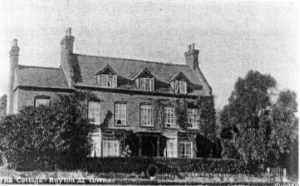 |
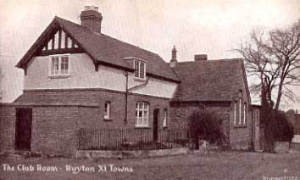 |
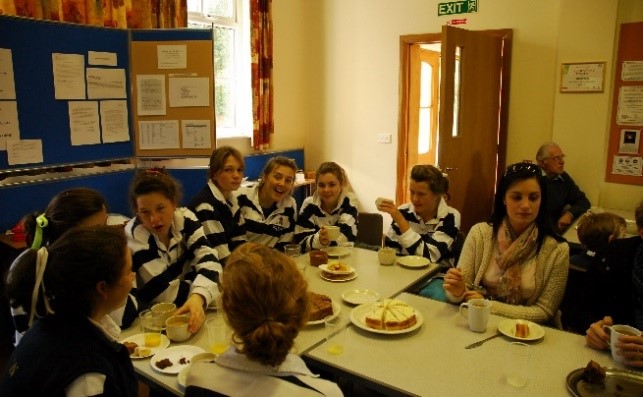 |
| The Cottage, home of Kenyon ladies & Library |
Old Postcard of The Club Room, Reading Rooms |
Girls from Ruyton School, Melbourne, Australia enjoying cake |
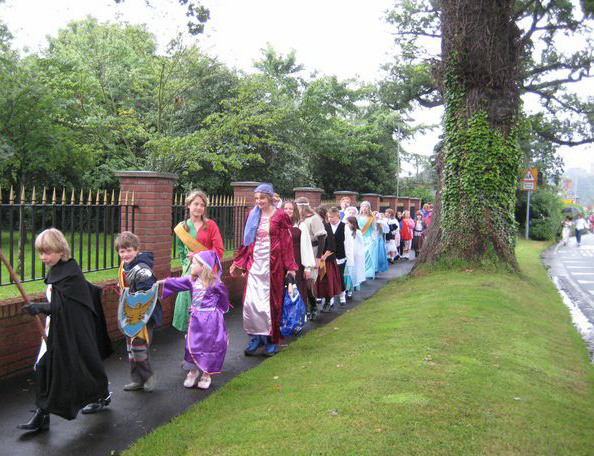 |
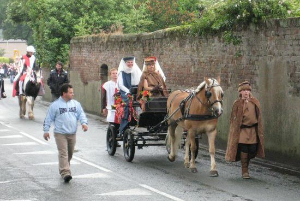 |
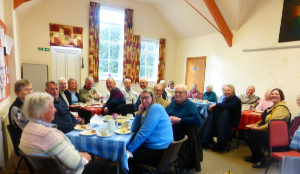 |
| Charter procession, Victoria Room to Burgage Field |
Mary le Strange leading the procession to the Burgage Field |
Jenny Baker`s 80th Birthday Tea Party 9th March 2024 |